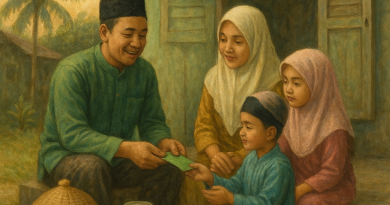Love for the Homeland in the Perspective of Faith

By Dr. Abdul Wadud Nafis, LC., MEI
“Love for the homeland is part of faith” (حب الوطن من الإيمان) is a phrase full of meaning, illustrating how Islam combines spiritual values with social responsibility. The homeland is not merely a place of residence, but a gift from Allah that must be protected, nurtured, and fought for. Love for the homeland is not only a sign of affection for the country, but also a form of devotion to Allah, as exemplified by the Prophet Muhammad SAW’s love for Mecca. Let us reflect on how love for the homeland can be a tangible manifestation of our faith.
The phrase حب الوطن من الإيمان (Love for the homeland is part of faith) holds significant value, both in religious and social contexts. Below is an explanation of the urgency of this expression:
1. Strengthening Love for the Homeland as Part of Faith Responsibility
Loving the homeland means maintaining its security, peace, and harmony. In Islam, safeguarding the safety of oneself, family, and community is an obligation that reflects one’s faith.
The Quran and Hadith teach us responsibility toward the environment and society, including the homeland. For example, in QS. Al-Baqarah [2]: 205, Allah does not like corruption on earth.
2. Honoring Allah’s Blessing
The homeland is a blessing that Allah has given to each individual. Love for the homeland means expressing gratitude for Allah’s gift by protecting and developing it.
The Prophet Muhammad SAW himself showed his love for Mecca, his birthplace. In a narration, he said during his migration: “By Allah, you are the most beloved land to me, and you are the most honorable land in the sight of Allah. Had I not been expelled from you, I would not have left.” (HR. Tirmidhi).
3. Instilling a Spirit of Unity and Service
Love for the homeland encourages people to fight together to preserve unity, prevent division, and protect the country from any threats.
This spirit aligns with the principle of ukhuwah wathaniyah (national brotherhood), which is in harmony with ukhuwah islamiyah (Islamic brotherhood).
4. Making the Homeland a Field for Good Deeds
Protecting the homeland from harm, improving the welfare of the community, and contributing to its development are part of amal shalih (good deeds). Every individual is responsible for their social environment.
Islam teaches the importance of amar ma’ruf nahi munkar (enjoining good and forbidding evil), which applies not only on an individual level but also on a larger scale, including the state and nation.
5. Fostering Tolerance and Compassion
Love for the homeland fosters tolerance in the midst of diversity. In a pluralistic society, love for the homeland involves respect for others, regardless of religion, ethnicity, or culture.
Conclusion
The expression حب الوطن من الإيمان emphasizes that love for the homeland is not only relevant to social life but is also part of our spiritual obligations. Love for the homeland is a reflection of true faith, manifested through tangible contributions in preserving and enriching the nation according to Islamic values.
Love for the homeland is not just a saying but a real proof of deep faith. Protecting, enriching, and defending the homeland is our devotion to Allah and to others. Let us make love for the homeland our motivation to continue contributing for the common good, for loving the country is part of loving the Creator.
References
1. Al-Qur’an al-Karim.
2. Al-Bukhari, Muhammad bin Ismail. Shahih al-Bukhari.
3. Muslim bin al-Hajjaj. Shahih Muslim.
4. Tirmidhi, Muhammad bin Isa. Sunan at-Tirmidhi.
5. Yusuf al-Qaradawi. (1998). Fiqh Prioritas: Urgensi Memahami Skala Prioritas dalam Islam. Jakarta: Gema Insani.
6. Syaltut, Mahmud. (1975). Islam: Aqidah wa Syariah. Mesir: Dar al-Qalam.
7. Rahmat, Jalaluddin. (2001). Islam Aktual: Refleksi Sosial Seorang Cendekiawan Muslim. Bandung: Mizan.
8. Nasution, Harun. (1986). Islam Rasional: Gagasan dan Pemikiran. Bandung: Pustaka Jaya.
9. Shihab, Quraish. (1996). Wawasan al-Qur’an: Tafsir Tematik atas Pelbagai Persoalan Umat. Bandung: Mizan.


